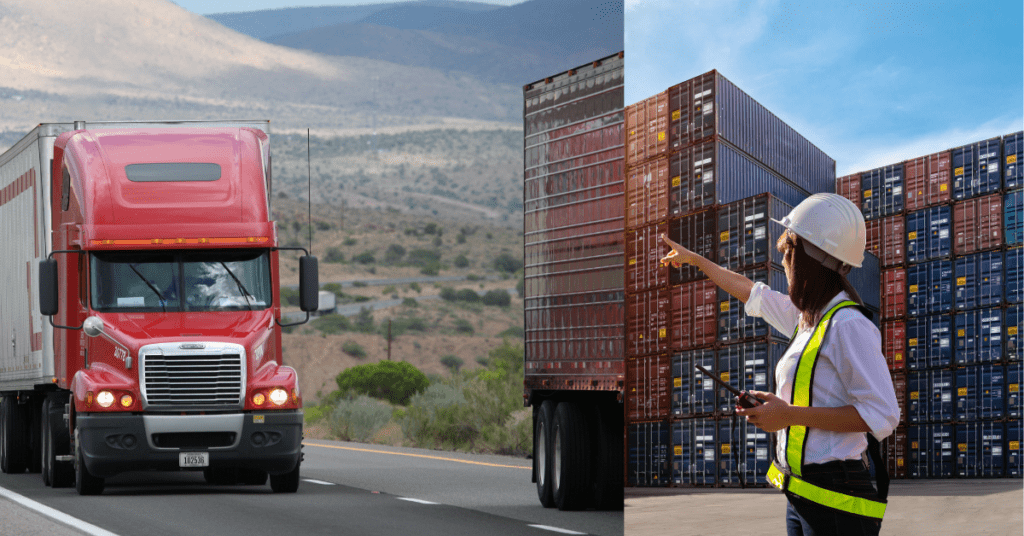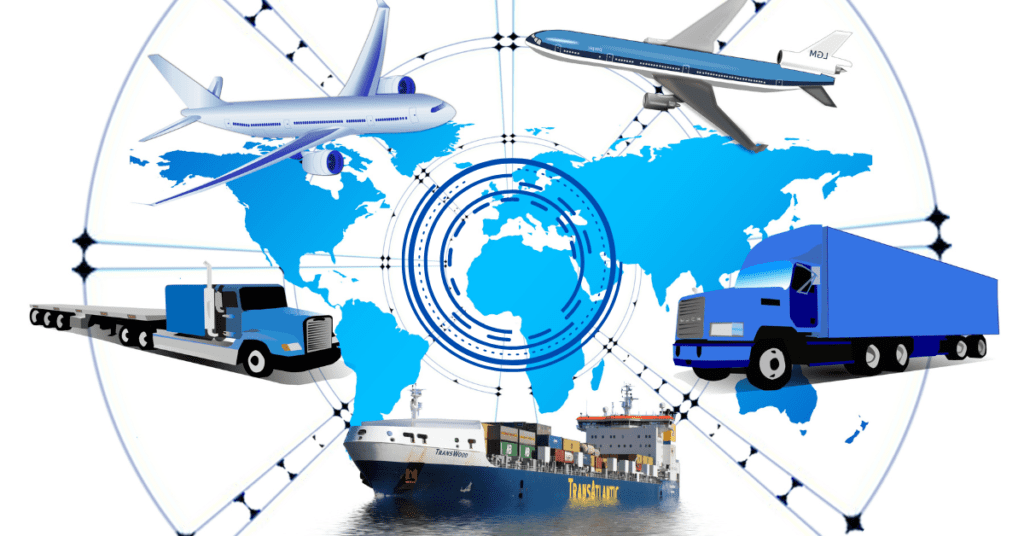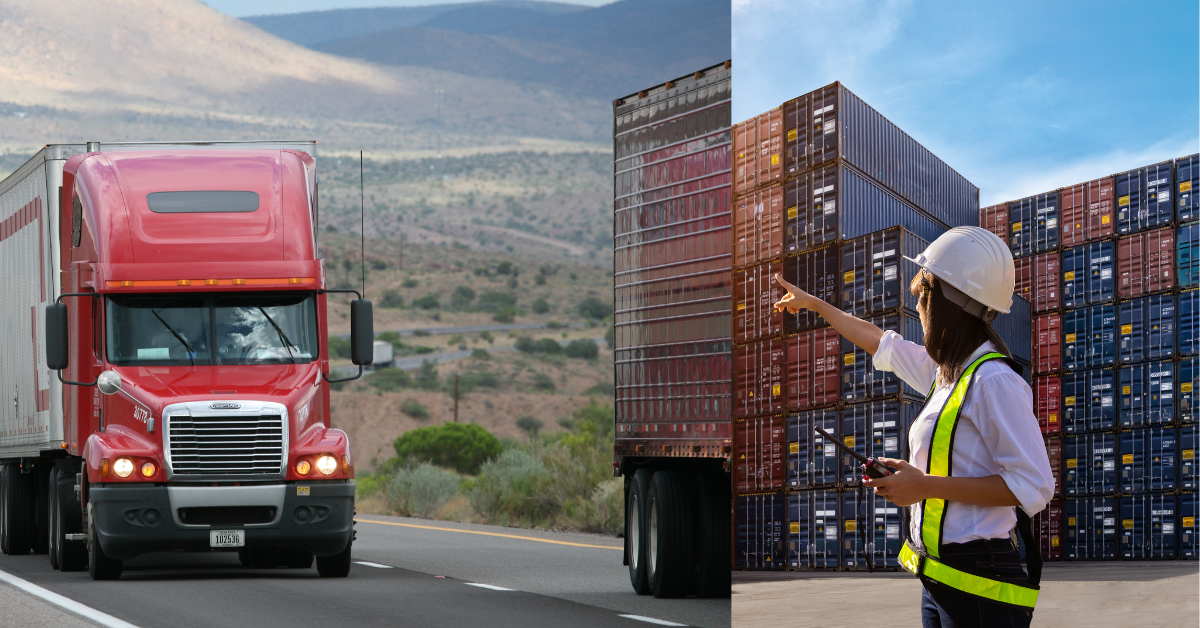In the dynamic landscape of global trade, the logistics industry plays a pivotal role in facilitating the seamless flow of goods. Today’s logistics complexity spans manufacturing, transportation, and distribution, demanding intricate coordination. This article delves into India‘s ambitious goals, the integration of innovative technologies, and the evolution towards sustainable and resilient logistics.

Streamlining Processes and Building Resilience in the Logistics Landscape
In the ever-evolving realm of global challenges, the logistics industry is strategically pivoting towards streamlining processes and fortifying resilience. The seamless flow of goods, a cornerstone of global trade and daily activities, is undergoing a transformation driven by India’s ambitious goals and a relentless pursuit of technological advancements.
India’s logistics industry Aspiration: A Technologically-Driven Approach
India is on a mission to ascend the Logistics Performance Index, targeting a coveted position within the top 25. Concurrently, there’s a concerted effort to reduce logistics costs from 13% to 8% of the GDP, with a bold aim of a 40% reduction in the next five years. This forward-looking strategy underscores the pivotal role of technology in optimizing logistics, fostering economic growth, and championing sustainability in the global trade landscape.
Technological Marvels Reshaping Logistics Dynamics
-
Artificial Intelligence (AI) and Machine Learning (ML): Enhancing Decision-Making
AI-powered systems are taking the lead in logistics optimization. Analyzing vast datasets, predicting demand patterns, and optimizing supply chain operations, AI and ML algorithms empower logistics providers to dynamically adapt to market changes. From route optimization to demand forecasting, these technologies promise greater efficiency and cost-effectiveness.
-
Internet of Things (IoT): Unprecedented Visibility and Efficiency
Smart sensors and trackers, integral components of IoT devices, offer unparalleled visibility into the supply chain. Monitoring the condition, location, and status of goods in real-time ensures better inventory management and proactive issue resolution. The deployment of autonomous robots and drones further enhances operational speed, accuracy, and cost-effectiveness.
-
Automation and RFID: Streamlining Operations
RFID tags, with unique identifiers, facilitate seamless tracking within the supply chain. Automation through RFID not only enhances inventory accuracy but also reduces manual handling errors and accelerates order fulfillment. Streamlining operations with automation leads to improved efficiency and a significant reduction in human errors.
Embracing Sustainable Logistics for a Greener Future
The adoption of green technologies, particularly electric vehicles, is reshaping the global transportation of goods. Businesses are actively exploring and integrating these eco-friendly alternatives, contributing to a cleaner and greener future.
The Crucial Nexus: Streamlining Processes and Building Resilience
In supply chain management, the dual focus on streamlining processes and building resilience is a strategic response to the challenges of a dynamic global landscape. Companies are channeling significant investments into cutting-edge technologies, employing real-time data analytics and predictive modeling to fortify visibility and responsiveness. This proactive approach enables businesses to swiftly identify potential disruptions and implement measures to minimize their impact, enhancing overall adaptability.
Integrating Sustainability for Robust Resilience
Recognizing the intertwined nature of environmental challenges and operational stability, companies are increasingly embracing eco-friendly initiatives. The combination of technological advancements with sustainability efforts positions organizations to navigate the complexities of future supply chains with agility and foresight.
Digital Transformation: The Logistics Metamorphosis
The wave of digitization is transforming the traditional logistics industry, replacing siloed processes with innovative technologies. From real-time tracking to predictive analytics, emerging technologies like IoT, blockchain, AI, and ML are reshaping the transportation, warehousing, and delivery of goods.
Innovations in Logistics Operations
logistics industry are at the forefront of experimenting with cutting-edge technologies. Robotic Process Automation (RPA) and AI-powered chatbots automate tasks, providing efficiency gains for customers. Investments in advanced infrastructure, such as automated sorting technology, enable handling large parcel volumes, optimizing space, and reducing operational costs.
Advancements in Customer Interaction Technologies
Generative AI, advanced Natural Language Processing (NLP) models, and customer service bots are elevating customer interactions. Rich NLP models empower virtual assistants and chatbots to comprehend complex queries, ensuring efficient problem resolution and improving customer satisfaction.
Data Privacy and Security Measures in the Digital Era
As digitization brings forth vast customer information, logistics companies prioritize robust data privacy measures and threat protection. Responsible data collection, processing, storage, and stringent privacy rules are coupled with cybersecurity measures to prevent unauthorized access and breaches. Regular security assessments, updates, and employee training contribute to a resilient and adaptable security system.
The Future Landscape of India’s Logistics Sector
The logistics industry in India is undergoing a monumental transformation, fueled by a surge in demand and technological innovations. Forecasts predict a market size of ₹30 trillion by the fiscal year 2027, with a Compound Annual Growth Rate (CAGR) of 11%.
Government Initiatives for Scalability
While private players gear up for growth, government initiatives like PM Gati Shakti and Bharat Mala Pariyojna focus on boosting the scalability of the logistics sector. Emphasizing infrastructure development and governance solutions, these efforts strategically pave the way for scalable logistics services. The National Logistics Policy (NLP) 2022 aims to ease goods movement and bolster the trade sector in India’s economy.
Embracing an Era of Efficiency with Technology
Technological strides in IoT, blockchain, AI, and cloud computing are propelling the logistics sector into an era of unparalleled efficiency and customer-centricity. Anticipate innovations like drone deliveries, RPA, and Q commerce taking the lead in the growth trajectory of logistics.

The 5G Revolution: Transforming Logistics Operations
With speeds rivaling home broadband and low latency, 5G is set to revolutionize homes and industries, providing solutions to historical challenges in logistics.
-
Real-time Tracking Beyond Barcodes and RFID
5G-enabled tracking surpasses traditional methods. Devices report their location independently and in real-time, allowing for precise tracing right to the shelf where a product is stored. This transparent and accurate tracking enhances supply chain visibility.
-
Complete Network for Unprecedented Connectivity
5G towers, with the capacity to support up to a million devices simultaneously, offer a significant upgrade from 4G limitations. This expansive network includes product inventory, delivery vehicles, on-site machinery, and essential tools. The result is faster, more precise planning, minimizing delays and maximizing equipment use.
-
Enhanced Security and Comprehensive Data Gathering
5G not only reduces the risk of goods being lost or stolen but also enables more comprehensive data gathering. Sensors measuring parameters like temperature and humidity, along with live video feeds, provide logistics companies with the tools to guarantee the quality of their service, particularly for transporting perishables.
-
Addressing Staff Shortages with 5G-Enabled Autonomous Vehicles
The development of 5G-enabled autonomous vehicles is a potential solution to skills shortages in logistics industry. These vehicles could drive autonomously for specific periods, allowing drivers more rest without compromising time on the road. There’s even the possibility of remotely controlling lorries, thanks to low latencies.
In conclusion, 5G isn’t just a technological gimmick; it’s poised to offer substantial benefits to logistics industry. With enhanced visibility across operations, 5G could be the linchpin for creating a truly robust and efficient supply chain.
Read: Alphabet Inc.’s X Lab : A Shift in Strategy and the Quest for Innovation


1 thought on “Revolutionizing logistics industry Through Technology: A Strategic Shift for Efficiency and Sustainability”